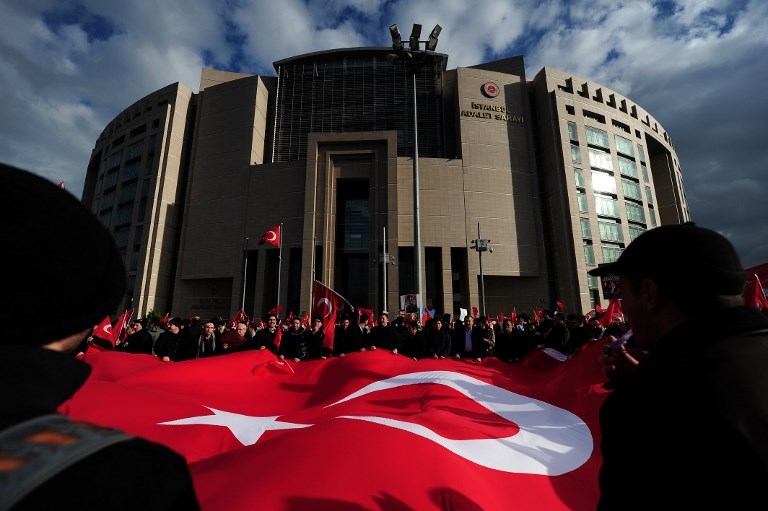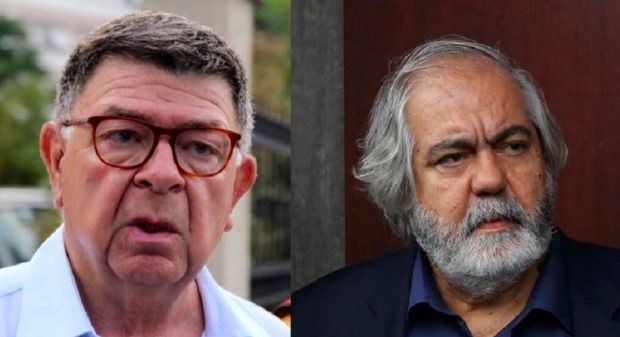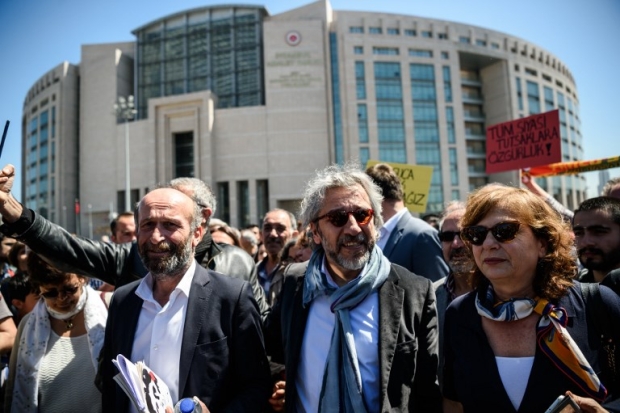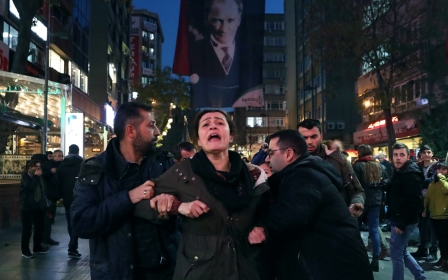Turkey slips towards legal abyss as top court's rulings ignored

ISTANBUL, Turkey – Concern is growing in Turkey over the deterioration of its rule of law and judicial institutions after the country's top court was blatantly ignored by government and lower courts earlier this month.
On 11 January, a lower court refused to abide by a ruling from Turkey's Constitutional Court, which serves as the guardian of the constitution and the public's constitutionally guaranteed rights.
It was the first time another body within the country's judicial structure has defied a top court ruling, marking a serious deviation from the past when attacks were limited to verbal political lashings.
The entire premise of a state of law is in danger if you have a lower court refusing to recognise a ruling from the country's highest court
- Osman Can, former constitutional court rapporteur and AKP MP
The constitutional court, in an 11-6 majority decision, had ruled that two imprisoned journalists, Mehmet Altan and Sahin Alpay, should be released pending a verdict since their basic rights had been violated.
The journalists were arrested 18 months ago and are accused of being part of the media wing of the Gulen movement which the government has designated a terrorist group and accuses of orchestrating the July 2016 coup attempt.
If convicted, Altan and Alpay face consecutive life terms for seeking to topple Turkey's constitutional order and membership in the Fethullahist Terrorist Organisation (FETO), the name the state uses for the movement.
But a few hours after the Constitutional Court's decision the lower court said it would not abide by the ruling because it had not been "notified".
The top court's ruling was announced to the public, and the court used a series of social media posts after the lower court's announcement to make clear that its ruling was part of the public record.
Translation: The Constitutional Court has ruled on the application regarding Mehmet Hasan Altan's application concerning his ongoing arrest. The press release and full article on the ruling can be found on the court's website.
Legal experts say the ruling constitutes a precedent and will apply to cases involving other journalists imprisoned after the coup, and prisoners who had been held for extended periods of time without trial.
On 12 January, the government publicly backed the lower court. Bekir Bozdag, deputy prime minister and government spokesman, said the Constitutional Court had exceeded its bounds.
"The Constitutional Court cannot exceed its legal limits while investigating individual applications. The Constitutional Court is not an appeal court. It acted like an appeal court in its rulings on Altan and Alpay," said Bozdag.
'Already shocking'
Jurists, however, are unconvinced and concerned that the developments reflect a state of law on the cusp of becoming dangerously politicised.
Osman Can, a former rapporteur at the Constitutional Court, a law professor and also a former MP from the ruling Justice and Development Party (AKP), told Middle East Eye that it is entirely within the scope of the Constitutional Court's jurisdiction to issue such rulings.
'If they are not freed very soon, it will be clear that no vestige of the rule of law remains in Turkey'
- Johann Bihr, Reporters Without Borders
"It is true that the Constitutional Court cannot acquit. But it can point out violations of basic rights and rule that those violations be righted," said Can.
On Monday, a second court rejected an appeal by Alpay's lawyers against the lower court's refusal to release him after the Constitutional Court's ruling.
"The imprisonment of Sahin Alpay and Mehmet Altan was already shocking and now it is illegal," said Johann Bihr, the head of the Eastern Europe and Central Asia desk at Reporters Without Borders. "If they are not freed very soon, it will be clear that no vestige of the rule of law remains in Turkey."
Can said despite the sensitivity surrounding these particular cases, the actions of the lower courts were cause for concern with regard to the state of law.
He said the fact that the cases were tied to FETO made it extremely sensitive from a political perspective, but a political approach could prove very damaging to the country's legal structures.
'I will neither abide by, nor respect the ruling'
In the recent past, it has been FETO-linked cases that have resulted in political attacks on the Constitutional Court.
On 28 February, 2016 Turkish President Recep Tayyip Erdogan lashed out at the Constitutional Court for another similar ruling, saying he "would neither abide by the ruling, nor respect it".
The Constitutional Court had ruled on 25 February 2016 that the rights of imprisoned journalists Can Dundar and Erdem Gul had been violated, and that they shouldn't be incarcerated while their trial was ongoing.
Among the charges the two journalists face are "espionage" and "conducting propaganda for a terrorist organisation". Their arrest came after they published a story regarding alleged arms shipments by Turkish intelligence to groups in Syria.
Gul remains in Ankara while Dundar, who was abroad when the 15 July 2016 coup attempt occurred, has refused to return to Turkey as long as a state of emergency - declared on 20 July 2016 and extended in three-month increments since then - remains in place.
State of emergency powers allow the government to rule by decree, bypassing parliament and also grant it enhanced policing and arrest powers.
Turkey's Constitutional Court excused itself from making any rulings pertaining to state of emergency rights violations shortly after it was implemented, citing lack of jurisdiction.
Wider implications
The recent concerns around the Constitutional Court's rejected ruling have brought into question its ability to serve as a course of legal redress within the Turkish judicial system.
"We call on the European Court of Human Rights to take note [of the Altan and Alpay situation]. The European court appears more than ever to be the only recourse available to Turkey's imprisoned journalists," said Bihr of Reporters Without Borders.
Insubordination by lower courts creates the risk of a lawless society while also having potential international repercussions, according to Can.
"Society loses the right and means to seek redress against legal violations of their rights. Members of society could then start seeking their own solutions to problems and that spells disaster for a state of law," said Can.
"If the court is disregarded, the European Court of Human Rights might also stop considering Turkey's Constitutional Court as a legitimate venue for legal redress that needs to be exhausted before it hears any case. And this is damaging for Turkey," he said.
This article is available in French on Middle East Eye French edition.
New MEE newsletter: Jerusalem Dispatch
Sign up to get the latest insights and analysis on Israel-Palestine, alongside Turkey Unpacked and other MEE newsletters
Middle East Eye delivers independent and unrivalled coverage and analysis of the Middle East, North Africa and beyond. To learn more about republishing this content and the associated fees, please fill out this form. More about MEE can be found here.






